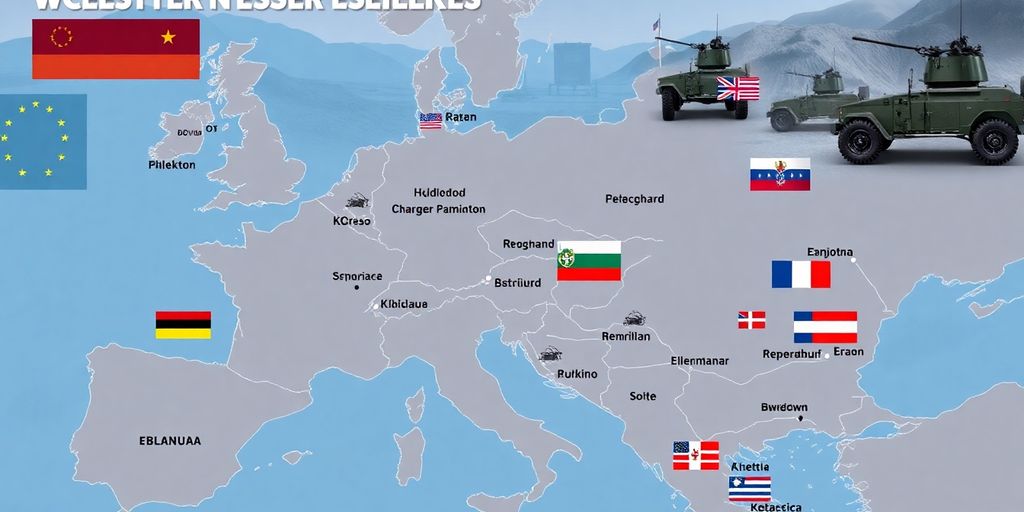The Western Balkans are witnessing a surge in military alliances and rising tensions, largely influenced by the geopolitical maneuvers of Russian President Vladimir Putin. As the region grapples with its complex history and ethnic divisions, the potential for conflict looms larger, prompting calls for greater European integration to counteract external threats.
Key Takeaways
- Putin’s influence in the Western Balkans is raising alarms among European leaders.
- The region is seen as a potential "playground" for Russia, with deep-rooted ethnic and religious tensions.
- British officials emphasize the need for the Western Balkans to integrate into the EU to counter Russian destabilization efforts.
The Geopolitical Landscape
The Western Balkans, which include countries like Bosnia and Herzegovina, Serbia, and Montenegro, have long been a hotbed of ethnic and political tensions. With the ongoing conflict in Ukraine drawing global attention, experts warn that Putin may exploit these divisions to further destabilize the region. British Foreign Secretary David Lammy has expressed concerns that Putin’s strategy involves keeping the region in a state of unrest, which could lead to renewed conflicts.
The Call for EU Integration
In response to the growing threat of Russian influence, British officials are advocating for the rapid integration of Western Balkan states into the European Union. They argue that this move is essential to promote stability and counteract external destabilization efforts. An anonymous British official remarked, "Right now they must move forward or they will continue to be Russia’s playground."
Rising Militarization and Alliances
Recent developments have seen a significant militarization of the region. A trilateral security cooperation agreement was signed between Albania, Croatia, and Kosovo, which has raised concerns in Serbia. This agreement aims to enhance military cooperation and joint exercises, further complicating the already tense relations in the region. Serbia’s response has been to strengthen its military ties with Hungary, which has been portrayed as a countermeasure to the NATO-aligned countries.
- Key Military Developments:
- Albania, Croatia, and Kosovo: Signed a trilateral security cooperation agreement.
- Serbia and Hungary: Strengthened military ties in response to NATO’s activities.
- Arms Purchases: Serbia has acquired military supplies from various countries, making it the most militarized power in the Balkans.
Historical Context and Current Risks
The historical context of the Western Balkans is marked by unresolved ethnic conflicts, particularly following the breakup of Yugoslavia in the 1990s. These unresolved issues create fertile ground for external powers like Russia to intervene. Experts fear that Putin may exploit these tensions to create new conflicts, complicating the EU’s efforts to stabilize the region.
Broader Implications for Europe
The situation in the Western Balkans is not isolated. Concerns are also rising in neighboring regions, particularly among the Baltic states, where officials worry that a ceasefire in Ukraine could embolden Russia to extend its military ambitions. The defense ministers of Estonia, Latvia, and Lithuania have expressed fears that Russia will not cease its aggressive posture, potentially threatening NATO’s northeastern flank.
Conclusion
As the geopolitical landscape continues to evolve, the Western Balkans stand at a critical juncture. The potential for renewed conflict fueled by Russian influence poses significant challenges not only for the region but for Europe as a whole. The call for EU integration is more urgent than ever, as leaders seek to prevent the Balkans from becoming a new front in Russia’s quest for power.
Sources
- Rising Tensions: Putin’s Growing Influence in the Western Balkans, BalkanEU.
- The shifting alliances and militarization of the Western Balkans : Peoples Dispatch, Peoples Dispatch.
- Western Balkans peace threatened by new military alliances? – DW – 04/11/2025, DW.
- News: NATO reaffirms its commitment to Western Balkans stability, as Secretary General Rutte wraps up
visits to Sarajevo and Pristina, 10-Mar.-2025, NATO. - Putin wants Western Balkans as his next ‘playground,’ UK warns – POLITICO, POLITICO.eu.






